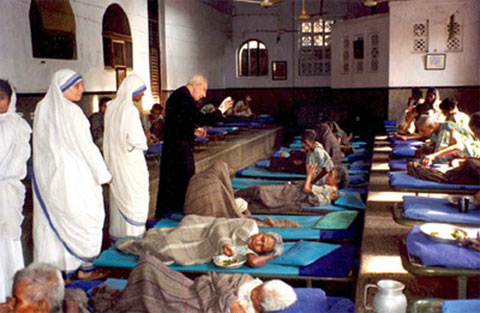On wanting to make a difference: questioning orthodox religion’s approach to helping the poor
Listen Now Download the show by right-clicking the link.

Mother Theresa's Home for the Dying in Calcutta. Photo: mariancatechist.com
Colette Livermore, M.D., joined Mother Teresa’s Missionaries of Charity, a religious organization within the Catholic Church, at the age of eighteen. After serving for eleven years, Livermore left the order, and obtained her medical degree from the University of Queensland. She is currently a general practitioner living in Australia. Her memoir, Hope Endures, was just published, and has been described as a “compelling chronicle of idealistic determination, rigid discipline, and shattering disillusionment.”
In this interview with Dr. Caldicott, Dr. Livermore talks about her experiences working with Mother Teresa, a Nobel Peace Prize winner, and the events that eventually led her to leave the order and take her life in a different direction. Along her journey, before she became a doctor, Dr. Livermore worked with Aborigines in Australia, with the people of East Timor, in a “garbage mountain” slum in Manila, and at Mother Theresa’s Home for the Dying in Calcutta. Those in the First World, Dr. Caldicott notes, do not appreciate how the Third World is often forced to live, in extreme poverty, sick with curable diseases, malnourished and facing starvation.
Dr. Livermore relates many challenging experiences in her training as a nun, working in the sometimes “medieval” world of Mother Theresa, which made her question the expectation of blind obedience and other extreme Catholic dogma that Mother Theresa, who was born in 1910, believed in. She believes that Mother Theresa was a good person with strong integrity who loved the poor, but that she was following the wrong map. Dr. Livermore’s instincts as a Good Samaritan were often thwarted by the order, and she was left to question her inner convictions. Her story about fighting to save a sick little boy is particularly enlightening.
In her concern about the harsh beliefs she encountered in the order, Dr. Livermore paraphrases Nobel Prize-winning physicist Professor Steven Weinberg, who stated that “Religion is an insult to human dignity. With or without it you would have good people doing good things and evil people doing evil things. But for good people to do evil things, that takes religion”.
Dr. Livermore and Dr. Caldicott question whether a belief system that the poor are meant to suffer is a healthy perspective. Dr. Livermore learned that what is most important is obeying her own principles.